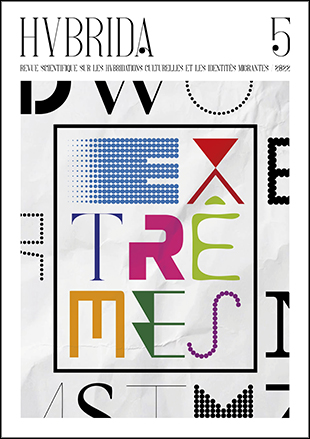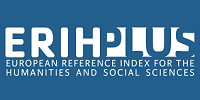One thousand flavours of translation in ‘Vivre l’orange – To Live the Orange’
DOI:
https://doi.org/10.7203/HYBRIDA.5(12/2022).25382Keywords:
Cixous, Derrida, multilingual writing, plureal feminine writing, literary translation Abstract
Abstract
This article attempts to read Hélène Cixous’ bilingual book Vivre l’orange – To Live the Orange (1979) through the lens of extreme multiplicity. I analyse the innumerable meanings given to the notion of translation in the book: for example, how translation functions as a form of embodied and affective knowledge and as such resembles creative writing. In addition to this, I compare Cixous’ writing and thinking to those of two Chicana authors, Cherríe Moraga and Gloria Anzaldúa, in order to decipher Cixous’ «non-original», but «oranginal» writing in the book. Finally, I consider her concept of the «source» in light of the similar concept of postcolonial thinker Trinh T. Minh-ha, and I examine the similarities between Cixous’ and Derrida’s ideas about linguistic exclusion in a (post)colonial context. Reading Cixous from the angle of extreme multiplicity allows us to suggest similarities between Cixous’ thinking and intersectional thinking.
 Downloads
Downloads
 References
References
Aguigah, R. (2020). Jacques Derrida fehlt der Welt. Weggefährtin Hélène Cixous über den Philosophen – ”Jacques Derrida fehlt der Welt” (deutschlandfunkkultur.de).
Antonaci Gama, C. (2019). Conflit et complicité. La communauté des femmes chez Clarice Lispector. [Thèse de doctorat]. Université de Montréal. https://papyrus.bib.umontreal.ca/xmlui/handle/1866/24786
Anzaldúa, G. (1987). Borderlands/La Frontera. The New Mestiza. Aunt Lute Books.
Apter, E. (2013). Against World Literature. On the Politics of Untranslatability. Verso.
Bonnet, M.-J. (2018). Mon MLF. Albin Michel.
Brownlie S. (2006). Investigating the Relationship between To Live the Orange and Vivre l’Orange. Women in French Studies, 14(1), 61-75. https://doi.org/10.1353/wfs.2006.0018
Cantú, N. & Hurtado, A. (2012). Introduction to the fourth edition of Borderlands/La Frontera. The New Mestiza. (pp. 3-14). Aunt Lute Books.
Cassin, B. (2004). Vocabulaire européen des philosophies. Dictionnaire des intraduisibles. Éditions du Seuil.
Cixous, H. (2004). Villes promises. In Vinqt et unièmes assises de la traduction littéraire (Arles 2004) (pp. 187-204). Actes Sud.
Cixous, H. (1989[1979]). Vivre l’orange / To Live the Orange. In L’Heure de Clarice Lispector. Éditions des Femmes.
Cixous, H. (1989). From the Scene of the Unconscious to the Scene of History. In R. Cohen (Ed.), The Future Literary Theory (pp. 1-18). Routledge.
Cixous, H. (1987). Extrême Fidélité. Travessia, (14),11-45.
Cixous, H. (1986[1976]). La Venue à l’écriture. In Entre l’écriture. Éditions des femmes.
Cixous, H. (1974). Prénoms de personne. Éditions du Seuil.
Cixous, H. (1968) L’Exil de James Joyce ou l’art du remplacement. Éditions Grasset.
Delmotte-Halter, A. (2014) Revoir Osnabrück : Sur la cuisine dans un livre d’Hélène Cixous. [Thèse de Doctorat]. Université de Nancy.
Derrida, J. (1996). Le Monolinguisme de l’autre ou la prothèse d’origine. Éditions Galilée.
Joyce, J. (1939). Finnegans Wake. Faber and Faber.
Minh-ha, T. T. (2005). Elsewhere, Within Here: Immigration, Refugeeism and the Boundary Event. Women Make Moves.
Minh-ha, T. T. (1989). Woman, Native, Other: Writing Postcoloniality and Feminism. Indiana University Press.
Moraga, C. (1983). Loving in the War Years – lo que nunca pasó por sus labios. South end press.
Neimanis, A. (2012). Hydrofeminism: Or, On becoming a Body of Water. A lyrical-philosophical exploration of becoming a body of water. In H. Gunkel, C. Nigianni & F. Söderbäck (Eds.), Undutiful Daughters: Mobilizing Future Concepts, Bodies and Subjectivites in Feminist Thought and Practice (pp. 96-115). Palgrave MacMillan.
Sardin, P. (2012). Traduire ou trajouir : de la traduction des néologismes dans Vivre l’orange d’Hélène Cixous et Mère la mort de Jeanne Hyvrard. Palimpsestes. Revue de traduction, (25), 111-123. https://doi.org/10.4000/palimpsestes.1775
Segarra, M. (2019). Derrida, Cixous, and (feminine) writing. In J.-M. Rabaté (Ed.), Understanding Derrida, Understanding Modernism (pp. 226-238). Bloomsbury.
Sellers, S. (1996). Hélène Cixous. Authorship, Autobiography and Love. Polity Press.
Willis, S. (1987). Mis-Translation: Vivre l’orange. SubStance, 16(52), 68-83. https://doi.org/10.2307/3685386
Published
How to Cite
-
Abstract420
-
HTML (Français )151
-
PDF (Français )266
Issue
Section
License
![]()
All the documents in the OJS platform are open access and property of their respective authors.
Authors publishing in the journal agree to the following terms:
- Authors keep the rights and guarantee HYBRIDA the right to be the first publication of the document, licensed under a Creative Commons license Attribution-NonCommercial-ShareAlike 4.0 International (CC BY-NC-SA 4.0) that allows others to share the work with an acknowledgement of authorship and publication in the journal.
- Authors are allowed and encouraged to spread their work (once published) through electronic means using personal or institutional websites (institutional open archives, personal websites or professional and academic networks profiles) once the text has been published.
















